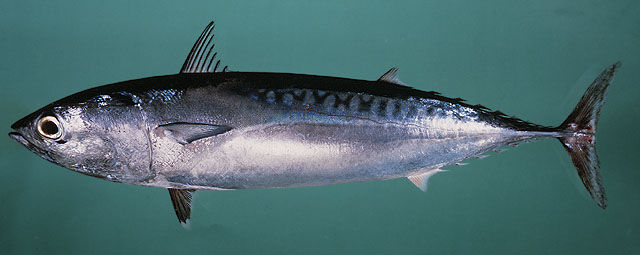Bullet Tuna, Auxis rochei (Risso 1810)

A Bullet Tuna, Auxis rochei, from Padang Bai, Bali, Indonesia. Source: John E. Randall / Fishbase via EOL. License: CC by Attribution-Noncommercial
A small tuna species which is not of great commercial importance to Australian fisheries. It is probably taken by recreational fishermen targeting its close relative, the Frigate Mackerel (Auxis thazard).
Bullet Tuna, Auxis rochei (Risso 1810)
More Info
|
Distribution |
Cosmopolitan distribution, found in all tropical and sub-tropic waters. Found off all Australian states. An oceanic species, epipelagic and neritic. A schooling species, the bullet tuna forms an important food source for larger tuna species, billfish, barracudas, sharks and other predators. |
|
Features |
D XX-XXII,0, 0, 10-13; A 0, 12-14. Dorsal fins separated by space equal to or longer than first dorsal fin base. Second dorsal and anal fins followed by eight and seven finlets respectively. Pectoral fins short, not reaching the anterior margin of the naked area above the corselet. Body robust, elongate and rounded. Small, conical teeth. Body naked except for corselet which is well developed and wide in its posterior section, usually 10-15 scales wide under second dorsal fin origin. Caudal peduncle with well developed keel, flanked on each side by a smaller keel. Swimbladder absent. |
|
Size |
Reaches at least 50 cm, but more commonly around 35 cm. This species does not grow as large as Auxis thazard. |
|
Colour |
Bluish dorsally, purple to black on head. White ventrally, lacking markings. Pectoral and pelvic fins purple, interior almost black. 15 or more vertical dark bars in the scaleless area above the corselet. |
|
Feeding |
Known to feed on smaller members of their own species. Prey items include fishes, crustaceans and cephalopods. |
|
Biology |
In Atlantic waters the length at first maturity is 35 cm for females and 36.5 cm for males. The spawning season varies, but can span the entire year depending on the location. Spawning occurs in batches, with each female spawning 31 to 103 thousand eggs depending on the size of the female. The total number eggs spawned in a season can reach over 1 million. The eggs and larvae are pelagic, able to tolerate water temperatures between 21.6 and 30.5 degrees. |
|
Fisheries |
Species of Auxis are not identified to species in commercial catches. Hence catches of Auxis thazard are probably partially compsed of A. rochei. |
|
Species Citation |
Scomber rochei, Risso 1810, Ichthyologie de Nice, ou histoire naturelle des poissons du département des Alpes Maritimes: 65, Nice, France. |
|
Author |
Fishes of Australia |
Bullet Tuna, Auxis rochei (Risso 1810)
References
Carpenter, K.E.; Niem, V.H. (eds). FAO species identification guide for fishery purposes. The living marine resources of the Western Central Pacific. Volume 6. Bony fishes part 4 (Labridae to Latimeriidae), estuarine crocodiles, sea turtles, sea snakes and marine mammals. Rome, FAO. 2001. pp. 3381-4218.
Collette, B.B. and C.E. Nauen, FAO species 1983, catalogue. Vol. 2. Scombrids of the world. An annotated and illustrated catalogue of tunas, mackerels, bonitos and related species known to date. FAO Fish.Synop., (125)Vol.. 2: 137 p.
Hoese, D.F., D.J. Bray, J.R. Paxton, & G.R. Allen. 2006. Fishes. in Beesley, P.L. & A. Wells. (eds) Zoological Catalogue of Australia. Volume 35. ABRS & CSIRO Publishing: Australia. parts 1-3, pages 1-2178.




